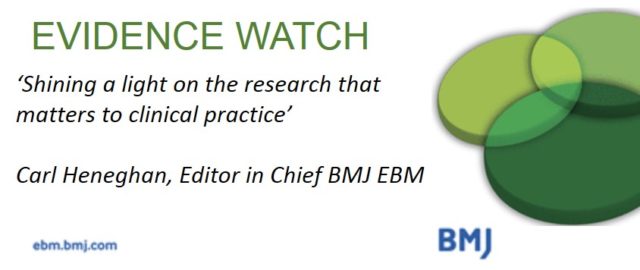Z-drugs might be associated with an increased risk of fractures, falls, and injuries and their use should be considered in the context of overall risk of falls in an individual Carl Heneghan Zolpidem, zopiclone, eszopiclone and zaleplon, are known as the ‘Z-drugs’. They even have their own Wikipedia page. They are a group of […]
Category: Evidence Watch

Crystalloids or saline?
Use of resuscitation fluids has largely been based on physiological principles rather than evidence. Carl Heneghan The debate over when to use crystalloids versus saline in unwell adults shows there has been considerable uncertainty about what to do in practice. Use of resuscitation fluids has largely been based on physiological principles rather than evidence. […]
Why I am confused about lung cancer screening
Should findings from a single trial inform decision making about lung cancer screening? Carl Heneghan, Editor in Chief A recent cost-effective analysis of low-dose computed tomography for lung cancer screening targeted in those at highest risk of lung cancer suggests only modest benefits. The conclusion is based on a cost-effectiveness analysis of risk-targeted screening […]
Evidence Watch: Implantable defibrillators might not affect death
Results of a recent review show a significant reduction in mortality with ICD. The effect, however, was weakened by the inclusion of the largest recent trial. Carl Heneghan, Editor in Chief One essential element of determining if a trial is sufficiently robust enough to believe the results is that the control group received standard […]
Evidence Watch: uncertainties with the evidence for influenza vaccination
This week’s Evidence Watch highlights serious uncertainties with the current evidence-base for influenza vaccination Carl Heneghan, Editor in Chief A systematic review of vaccines in the elderly [1] highlights the difference vaccination makes in a single season (lowers risk of influenza from 6% to 2.4%); but adds caution, in that we have very little […]
Evidence Watch: Carl Heneghan’s view on evidence that impacts practice
This week’s Evidence Watch highlights preoperative physio, the risk of heart disease in relation to the number of cigarettes smoked per day, use of antipsychotics in hospital and risk of pneumonia, the effect of exercise across 17 countries and the impact of having a large preterm baby. Carl Heneghan, Editor in Chief Does a single […]
Evidence Watch: Carl Heneghan’s selection of evidence that impacts on practice
This week’s Evidence Watch highlights the risk of pre-eclampsia with metformin, the role of repeated influenza vaccination, de-prescribing medications and assessing harms in the elderly at the time of elective surgery. Carl Heneghan, Editor in Chief A meta-analysis evaluating the risk of pre-eclampsia in women taking metformin before, or during pregnancy found that there […]
Evidence Watch: Carl Heneghan
This week’s Evidence Watch highlights the risk of acute kidney injury, appropriate use of antibiotics, chest pain rules, interventions to reduce pre-term birth and calcium and vitamin D supplements Carl Heneghan, Editor in Chief Concern over renal injury with contrast-enhanced CT was laid to rest with a meta-analysis of 28 studies in the Ann […]
Evidence Watch: BMJ EBM
Each week our editors select from over 100 journals reliable and useful evidence summarised in BMJ Evidence-Based Medicine. Carl Heneghan, Editor in Chief There’s a lot of research at the moment on blood pressure and what’s the right target to treat too. A JAMA systematic review looked at mortality and cardiovascular disease across blood pressure […]
Evidence Watch: BMJ Evidence-Based Medicine
Each week our editors select from over 100 journals reliable and useful evidence that we summarise in BMJ Evidence-Based Medicine. Carl Heneghan, Editor in Chief Evidence Watch, provides the articles likely to impact practice that our editors select: if you don’t have time to read them then access the summaries at BMJ Evidence-Based Medicine: Week beginning […]